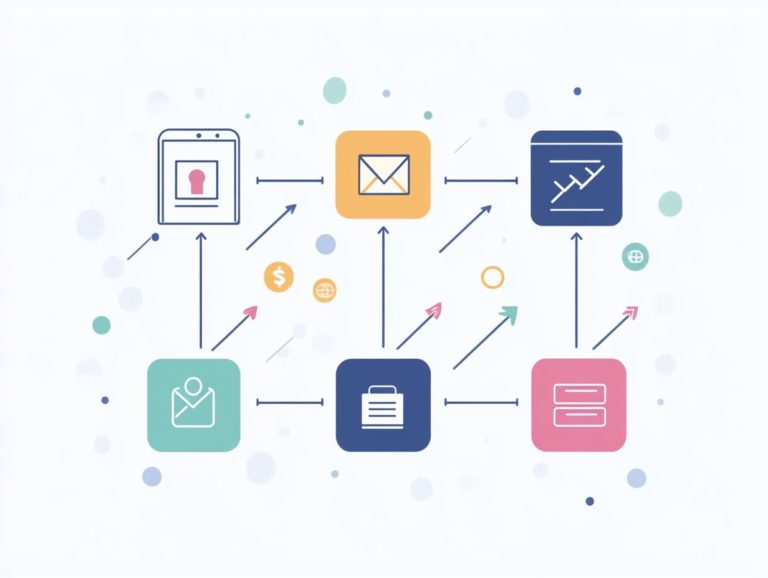CRM Integrations for Enhanced Data Security
In today s fast-paced business landscape, mastering effective customer relationship management (CRM) is essential for your success. CRM, which stands for Customer Relationship Management, helps businesses manage interactions with customers.
CRM integrations serve as a cornerstone for enhancing data security, streamlining workflows, and elevating customer experiences. These integrations are crucial for improving the way you engage with customers.
Get ready to discover the exciting benefits of CRM integrations, highlighting the different types native and third-party options and the critical factors you should consider before making your selection. You’ll also find best practices for successful implementation, ensuring that your systems operate seamlessly together.
Don t wait! Learn how to elevate your CRM strategy now and drive your business forward.
Contents
- Key Takeaways:
- Benefits of CRM Integrations
- Types of CRM Integrations
- Factors to Consider Before Choosing a CRM Integration
- Best Practices for Implementing CRM Integrations
- Frequently Asked Questions
- What is the purpose of CRM integrations for enhanced data security?
- How do CRM integrations enhance data security?
- Which types of CRM integrations are available for enhanced data security?
- Are CRM integrations for enhanced data security easy to implement?
- Can CRM integrations impact the performance of a CRM system?
- How do I know if my business needs CRM integrations for enhanced data security?
Key Takeaways:

- Enhance data security by integrating your CRM with other tools.
- Streamline workflows to boost efficiency.
- Improve customer experience through personalized communication.
What are CRM Integrations?
CRM integrations represent the sophisticated connection between your CRM systems and a variety of software tools. These connections allow you to streamline operations, enhance data security, and optimize customer engagement.
These integrations encompass applications designed to manage customer data, facilitate secure communications, and improve workflow efficiency, all in line with contemporary business objectives.
By leveraging artificial intelligence and machine learning, you can predict customer behavior and tailor your services to meet their needs effectively.
Incorporating popular CRM platforms like Salesforce and Microsoft 365 into these integrations enables you to utilize a wide range of functionalities that foster meaningful interactions with your clients. These tools help manage customer relationships while streamlining the onboarding process, tracking customer interactions, and automating routine tasks.
Robust CRM integrations are vital in mitigating risks associated with data breaches and cybersecurity threats. For a thorough understanding, refer to the comparison of CRM security features. By employing stringent data governance protocols, you ensure that sensitive information remains protected.
Ultimately, adopting such integrations enhances customer satisfaction and reinforces your commitment to maintaining a secure and responsive environment.
Benefits of CRM Integrations
The advantages of CRM integrations are significant, offering enhanced data security, improved customer engagement, and streamlined workflows. Together, these elements enable you to achieve operational excellence while maintaining compliance with regulations like GDPR and CCPA.
Such integrations are vital in establishing a trusted access system, meaning you only allow trusted users to access sensitive information. This ensures that your sensitive information remains safeguarded from unauthorized access and potential data breaches.
Enhanced Data Security
Enhanced data security is a key benefit of CRM integrations, providing robust measures to protect sensitive customer information from data breaches. When you use CRM systems equipped with advanced encryption and strict access controls, you significantly reduce risks related to internal vulnerabilities and employee negligence, highlighting the importance of security in CRM implementation.
By prioritizing cybersecurity training, you can ensure that your team is well-informed about potential security threats.
In addition to these foundational measures, many CRM integrations include secure token-based authentication, ensuring that only authorized users can access sensitive data. Regular security audits and comprehensive risk assessments align with industry standards like SOC 2 and ISO 27001, assuring you that your systems not only meet but exceed regulatory requirements.
This is especially crucial in sectors like healthcare and finance, where the integrity and confidentiality of customer information are paramount. These industries often handle highly sensitive data, and any compromise could lead to severe consequences.
By leveraging these advanced security features, you can foster trust among your clients and stakeholders while ensuring compliance with regulatory mandates.
Streamlined Workflows
Imagine a workplace where tasks flow effortlessly! CRM integrations boost operational efficiency and ensure timely service delivery.
By automating routine tasks and allowing smooth data sharing between software tools, you can enhance workflow processes and improve document management. This leads to greater customer satisfaction.
For instance, automating lead tracking or email follow-ups reduces human error. Your sales teams can then focus on building relationships instead of manual data entry.
Integrating CRM systems with project management or accounting tools keeps information updated across all platforms. This ensures accurate, real-time data for every department.
Effective data management protects data integrity and helps your teams make informed decisions quickly, adapting to market changes and customer needs.
Improved Customer Experience

Improved customer experience is a key advantage of CRM integrations. Engage customers more effectively and tailor services to meet their needs.
Using artificial intelligence and machine learning, you can predict customer behavior. This enables personalized interactions that strengthen relationships.
With secure messaging features, you can communicate in real-time, answering inquiries instantly and boosting satisfaction.
Targeted marketing campaigns help you understand customer preferences. This allows for promotions that truly resonate with your audience.
This level of engagement drives loyalty and encourages repeat business, strengthening your brand’s connection with customers.
These strategies improve customer interactions while aligning with your business goals, like revenue growth and standing out in the market.
Types of CRM Integrations
CRM integrations fall into native and third-party categories, each offering unique benefits for your business needs.
Native integrations function within the CRM platform, ensuring smooth user experiences. Third-party integrations connect external tools, enhancing customer data management and workflow optimization.
This approach lets you fully leverage your CRM system’s potential.
Native Integrations
Native integrations offer built-in functionalities that connect CRM systems with other software securely. These connections streamline operations and enhance user experiences.
Faster implementation lets you focus on what you do best, rather than dealing with technical issues. This efficiency allows for quick adaptation to market shifts.
With robust data security, sensitive information is protected, which boosts customer trust and loyalty.
Utilizing these features improves customer relationship management. It sets the stage for personalized interactions and targeted marketing.
Streamlined workflows through native integrations enhance operational efficiency and overall business performance, positioning your company for long-term success.
Third-Party Integrations
Third-party integrations connect your Customer Relationship Management (CRM) systems with external software tools to improve functionality and enhance data protection measures.
By leveraging these integrations, you can access additional resources to create comprehensive solutions for managing customer data and optimizing workflows.
Popular platforms like Zapier, HubSpot, or Zendesk help you streamline operations and reinforce your commitment to data privacy. These tools feature robust security protocols to ensure compliance with industry regulations, safeguarding your sensitive information.
Such integrations can significantly boost customer engagement, enabling personalized communication strategies and targeted marketing campaigns.
Ultimately, the combined capabilities of your CRM and its third-party connections create a holistic approach to managing customer relationships while adhering to stringent security standards.
Factors to Consider Before Choosing a CRM Integration
When selecting a CRM integration, consider several critical factors. Compatibility with your existing systems is paramount, as is understanding the cost implications involved.
The overall implementation process is also important. Ensure the integration aligns seamlessly with your current software tools and supports robust data security measures. This approach minimizes risks and optimizes workflows.
Compatibility with Existing Systems

Compatibility with your existing systems is essential when considering CRM integrations. It ensures seamless functionality and reduces the risk of operational disruptions.
Carefully evaluate how well any new integrations will mesh with your current software tools and data infrastructure. Aim to maximize efficiency and minimize troubleshooting efforts.
This evaluation requires a look at the technical specifications and capabilities of the new system, along with assessing how your existing workflows will adapt to potential changes.
To gauge compatibility, conduct thorough system audits, pinpoint critical data points, and engage key stakeholders in discussions.
Neglecting compatibility can lead to significant setbacks, such as data loss, increased downtime, and decreased employee productivity. Therefore, comprehensive testing before implementation is imperative.
Taking a proactive approach helps you avoid pitfalls and facilitates a smoother transition into the new system.
Cost and Implementation Process
Understanding the costs and implementation process involved in CRM integrations is essential for making informed decisions and allocating resources effectively.
A clear view of financial implications, paired with a streamlined implementation strategy, paves the way for successful integrations while ensuring robust data security measures.
Several cost structures come into play, including:
- Licensing fees for the CRM software, which may vary based on the number of users or required features.
- Ongoing maintenance costs, which could include software updates and customer support services.
- Hidden expenses, such as training your staff and managing potential downtime during the transition, as these can impact your budget significantly.
The implementation process typically spans several weeks or months and requires dedicated resources like IT personnel and data analysts to ensure smooth execution.
Prioritize data security now to keep your information safe; safeguarding sensitive information is vital for maintaining trust and compliance.
Best Practices for Implementing CRM Integrations
To implement CRM integrations effectively, adhere to best practices such as comprehensive testing, meticulous employee training, and continuous maintenance.
This approach ensures optimal performance and safeguards data security. By focusing on these aspects, your business can enhance its CRM systems while maintaining compliance with essential regulations.
Evaluate your current systems today to ensure a seamless transition!
Thorough Testing and Training
Thorough testing and training are vital for successfully integrating your CRM system. This step helps identify potential issues early and prepares your employees to navigate new systems effectively.
Skipping testing and training can increase the risks of data breaches and operational inefficiencies. Prioritize testing methods like user acceptance testing (UAT) and performance testing before full implementation.
User acceptance testing involves real users checking the system to ensure it meets your organization s needs. Performance testing assesses how responsive the system is under various loads.
Structured employee training programs boost user skills and foster a culture of compliance. Ongoing training keeps employees informed about security measures and compliance requirements, helping your organization stay resilient against threats.
Regular Maintenance and Updates
Regular maintenance and updates are crucial for maintaining the performance and security of your CRM integrations. They ensure your systems comply with evolving regulations and industry standards.
Prioritize regular updates to protect sensitive information and address security threats. These checks enhance data integrity and implement the latest security patches against vulnerabilities.
Staying updated allows you to take advantage of new features that improve user experience and efficiency. Compliance with regulations like GDPR and CCPA is essential, requiring strict data protection measures.
Neglecting updates can lead to non-compliance, resulting in heavy fines and reputational damage. Consistent maintenance is not just a best practice; it s critical for safeguarding your assets and enhancing business resilience.
Frequently Asked Questions

What is the purpose of CRM integrations for enhanced data security?
CRM integrations help protect sensitive customer information like contact details and payment data, including popular CRM integrations for e-commerce. They aim to shield this data from cyber threats and unauthorized access.
How do CRM integrations enhance data security?
These integrations use techniques like data encryption and access controls to strengthen security. This ensures that only authorized users can access and change sensitive information, reducing the risk of breaches.
Which types of CRM integrations are available for enhanced data security?
Types of CRM integrations include single sign-on (SSO), data encryption, and two-factor authentication (2FA). Each offers different security levels suited to various businesses.
Are CRM integrations for enhanced data security easy to implement?
The ease of implementing these integrations depends on the specific integration and your CRM platform. Some may need technical skills, while others offer user-friendly setups.
Can CRM integrations impact the performance of a CRM system?
Integrations might slightly affect performance, especially if they involve encryption or extra authentication steps. However, the added security is worth a minor performance dip.
How do I know if my business needs CRM integrations for enhanced data security?
If your business handles sensitive customer data, especially in finance or healthcare, CRM integrations are highly recommended. It’s smart to proactively protect your customers’ data and your reputation, so it’s essential to understand how secure CRM software is.






